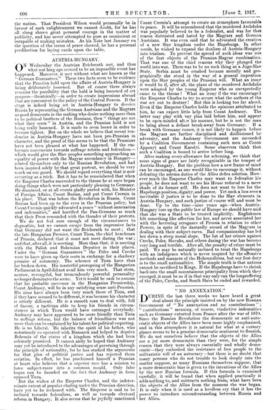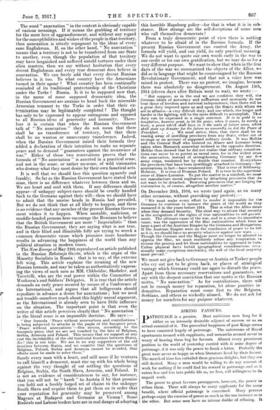" NO ANNEXATION." D URING the last three weeks we have
heard a great deal about the principle insisted on by the new Russian Government of " No annexation and no contributions " ; " contributions " meaning, of course, vindictive indemnities such as Germany extorted from France after the war of 1870. Since the Russian Revolution the democratic or anti-auto- cratic objects of the Allies have been more highly emphasized, and in this atmosphere it is natural for what at a cursory glance seems to be a genuine democratic sentiment to flourish. We do not ourselves believe that the objects of the Allies are a jot more democratic than they were, for the simple reason that they were always essentially and wholly demo- cratic—they embodied the resistance of free people to the militaristic will of an autocracy—but there is no doubt that many persons who do not trouble to look deeply into the matter suppose, as many Russians themselves suppose, that a more democratic bias is given to the intentions of the Allies by the new Russian formula. If this formula is examined carefully, it will be found that when applied practically it adds nothing to, and subtracts nothing from; what have been the objects of the Allies from the moment the war began. It is only when it is used as a heedless cry that it has the power to introduce misunderstanding between Russia and her Allies. The word " annexation " in the context is obviously capable of various meanings. If it means the grabbing of territory for the mere love of aggrandizement, and without any regard for the susceptibilities and wishes of the people in that territory, then annexation is utterly repugnant to the ideas of every sane Englishman. If, on the other hand, " No annexation " means that a territory is not to be transferred from one State to another, even though the population of that territory may have languished and suffered untold tortures under their alien masters, then we say without hesitation that every decent Englishman and every true democrat does believe in annexation. We can freely add that every decent Russian believes in it too. To what country have the Armenians turned in their agony ? What country has been continually reminded of its traditional protectorship of the Christians under the Turks ? Russia. Is it to be supposed now that, in the name of some supposed democratic idea, the Russian Government arc anxious to hand back the miserable Armenian remnant to the Turks in order that their ex- termination may be legitimately completed ? The thought has only to be expressed to appear outrageous and opposed to all Russian ideas of generosity and humanity. There- fore it is certain that when the Russian Government talk of " No annexation " they do not mean that there shall be no transference of territory, but that there shall be no wanton or unnecessary transference. Indeed, when the Russian Government issued their formula they added a declaration of their intention to make no separate peace and to demand " guarantees against the recurrence of war." Either of those two reservations proves that the formula of "No annexation " is asserted in a practical sense, and not in the sense, or rather no-sense, of wild visionaries who destroy what they most desire by their own fanatical acts.
It is well that we should face this question squarely and frankly. So far as the Russian Government have stated their aims, there is no difference whatever between them and us. We are heart and soul with them. If any difference should appear—if unhappy subject-races should-be cruelly handed back to the Germans against their will—then we should have to admit that the unwise heads in Russia had prevailed. But we do not think that at all likely to happen, and there is no evidence that any member of the present Russian Govern- ment wishes it to happen. When unstable, malicious, or muddle-headed persons here encourage the Russians to believe that the British Government are more Imperialistic " than the Russian Government, they are saying what is not true, and in their blind and illimitable folly are trying to wreck a common democratic cause which promises more handsome results in advancing the happiness of the world than any political situation in modern times. The New Europe of May 24th reproduced an article published in the Russian Rabotsaja Gazeta, which is the organ of the Minority Socialists in Russia ; that is to say, of the extreme left wing. This article explains the meaning of the new Russian formula, and may be taken as authoritatively express- ing the views of such men as MM. Chkheidze, Skobelev, and Tserctelli, who are the real power within the Committee of Workmen's and Soldiers' Delegates. It is true that the article demands an early peace secured by means of a Conference of the International, and argues that all belligerents should repudiate in advance a desire for annexations ; but we need not trouble ourselves much about this highly unreal argument, as the International is already seen to have little influence on the situation. The important point is that even the writer of this article perceives clearly that " No annexation " in the literal sense is an impossible doctrine. He says :- " Our formula ' Peace without annexations and contributions' is being subjected to attacks in the pages of the bourgeois press. ` Peace without annexations '—this moans, according to the bourgeois press, that wo aro not touched by the fate of Belgium, Serbia, Armenia and Poland. This means that we support at any cost the inviolability of the old territorial frontiers between States. No ! this is not true. Wo are in no way supporters of the old frontiers between States, and wo consider that the questions of Belgium, Poland, Serbia and Armenia cannot be avoided, that efforts must be made to solve them."
Surely every man with a heart, and still more if he ventures to call himself a democrat, must rise up with his whole being against the very thought of not settling the questions of Belgium, Serbia, the South Slays, Armenia, and Poland. It is not an evidence of considerateness to say, for instance, that you will not be " harsh " to Austria if by that promise you hold out a freshly forged set of chains to the unhappy .,4outh Slays and require them to put them on in order that your reputation for generosity may be preserved among Magyars at Budapest and Germans. at Vienna ! Some Radicals and Labour leaders here are in real danger of adopting this horrible Hapsburg policy—for that is what it is in sub- stance. How strange are the self-deceptions of some men who call themselves democrats !
From a truly democratic point of view there is nothing whatever to be afraid of in the Russian formula. If the present Russian Government can control the Army, the formula will yield, and can yield, its only practical meaning. We do not want to quote our own words early in the war to our credit or for our own gratification, but we may do so for a very different purpose. We want to show that when in the first days of the war we summarized the objects of the Allies, we did so in language that might be countersigned by the Russian Revolutionary Government, and that not a voice here was raised in protest. There was no protest, we imagine, because there was absolutely no disagreement. On August 15th. 1914 (eleven days after Britain went to war), we wrote " But suppose, as in the end we are confident they will, the German ideals of autocracy and militarism and monopoly do not boat those of freedom and national independence, then there will be a groat duty imposed upon us and upon the States with whom we are in alliance—a very difficult duty, and ono which, the longer and harder is the fighting, will be the more difficult to accomplish. That duty can be expressed in a single sentence. It is to yield to no temptation, however great, to let the peace, when it comes, be merely a truce, a peace which shall have in it the seeds of future wars, whirl shall store up disaster for the future as assuredly as did the Peace of Frankfort. , . . We must strive, then, that there shall be no tearing away of unwilling provinces from any State, either out of revenge or on account of supposed military needs. It was Moltke and the General Staff who insisted on Alsace and Lorraine being taken when Bismarck somewhat inclined in the opposite direction. Moltke thus showed that he did not realize that military considera- tions can never be so potent as moral ones, for in the widest sense the annexation, instead of strengthening Germany by say five army corps, weakened her by double that number. Everywhere the provinces that have been unwillingly attached to Germany—her annexations, in fact—have weakened her. That is true of Schleswig- Holstein. It is true of Prussian Poland. It is true in the suprothest sense of Alsace-Lorraine. To put the matter in a nutshell, wo must not manufacture moral explosives by detaching provinces that do not want to be detached. Restoring provinces that are longing for restoration is, of course, altogether another matter."
On December 30th, 1916, we wrote (and again, as on many other occasions, without provoking any protest) :- " We must make every effort to render it impossible for the Germans to continue to menace the peace of the world as they menaced it in the years before 1914. That is what the Allies mean when they demand Security. The chief way to attain that security is the recognition of the rights of true nationalities to self-govern- ment. The ultimate cause of the war, and in a sense its immediate cause, was the oppression of the Slav nationalities which form se largo a part of the Austrian Empiro by the Germans and Hungarians. If the Austrian Empire were on the conclusion of peace to be loft as it is, wo should have no security whatever against new wars. . . . Though the Gorman and the Magyar must no longer be allowed to
oppress the Slav, we must resolutely refuse any temptation to reverse the process and let those nationalities be oppressed in turn_ Unless physical facts forbid (geographical considerations occa- sionally make exceptions inevitable), the will of the local majority must prevail."
We must not give back to Germany or Austria or Turkey people who cry out not to be given back, or places of strategical vantage which Germany could use again to disturb the peace. Apart from these necessary reservations and guarantees, we say with the deepest conviction that our motto is the Russian motto, " No annexation." As for contributions, there will not be enough money for reparation, let alone punitive in- demnities. Reparation must come first to the Belgians. Serbians, and others so wickedly abused. We do not ask for money for ourselves for any purpose whatever.



























 Previous page
Previous page